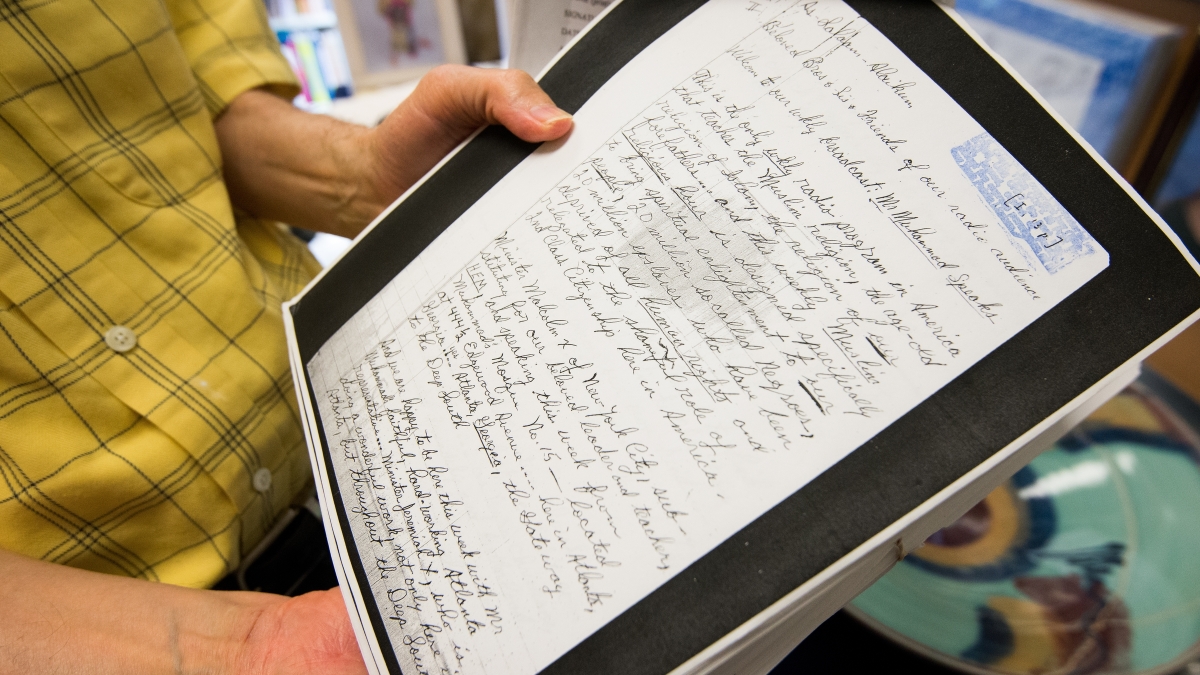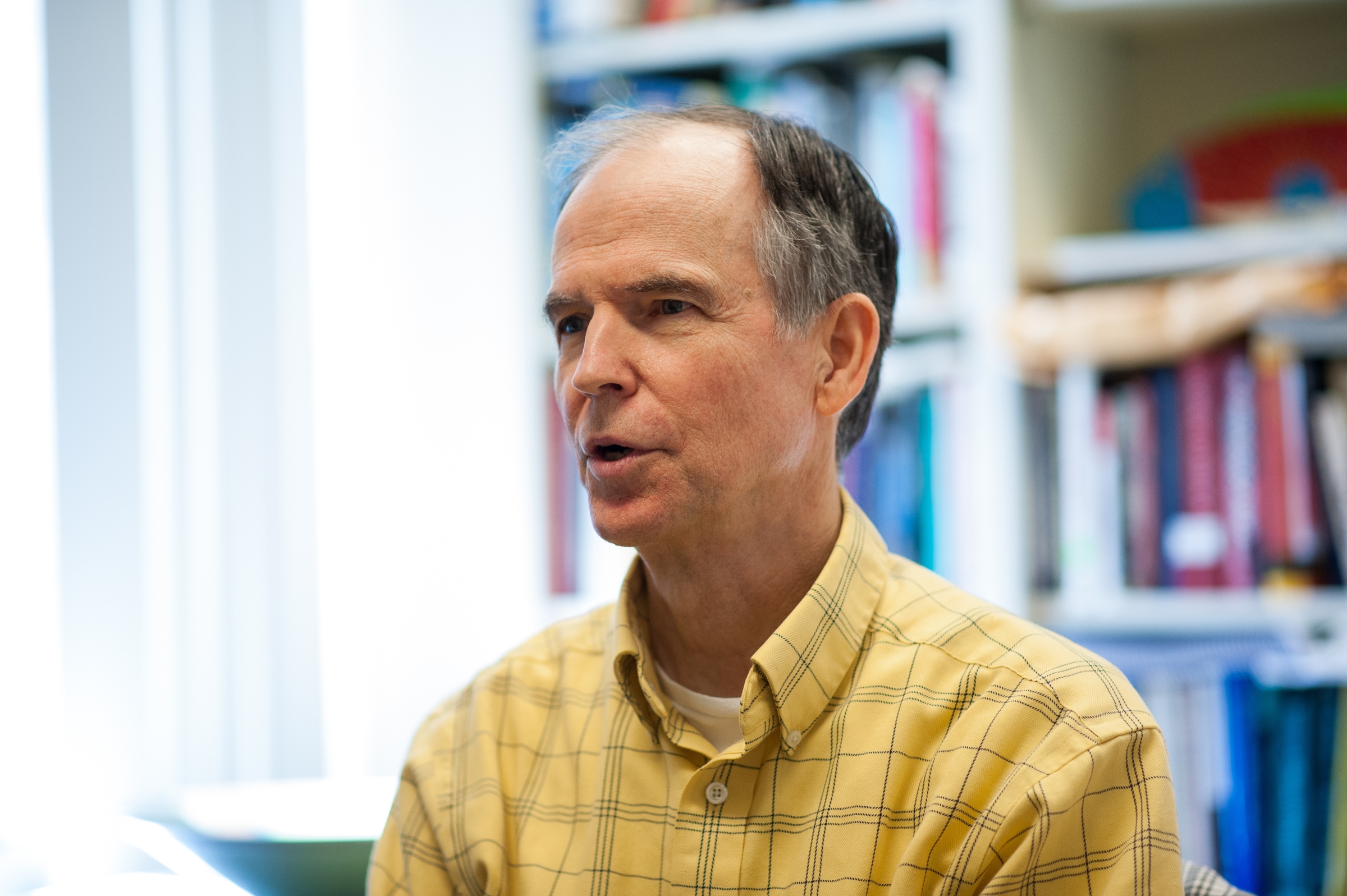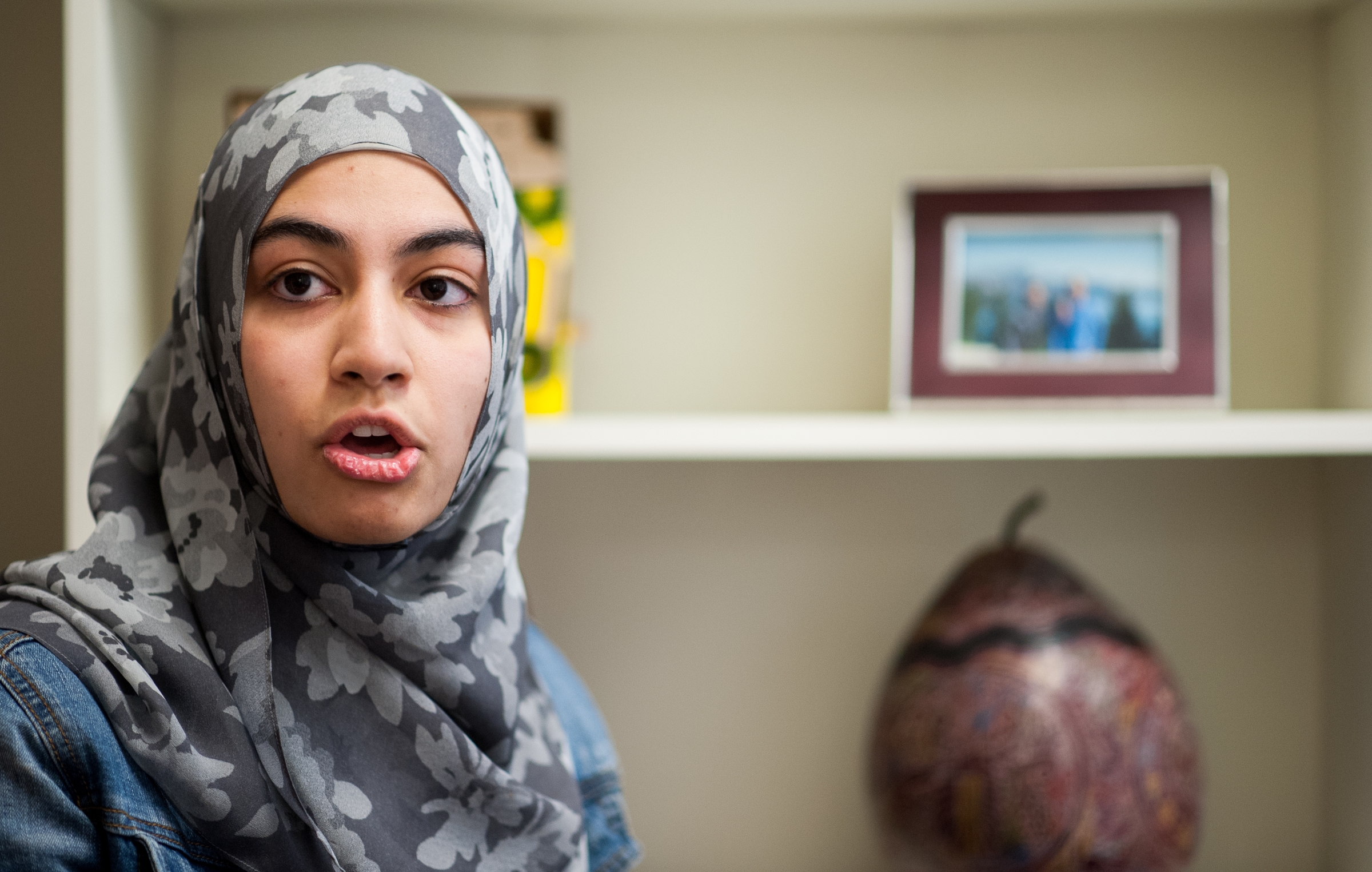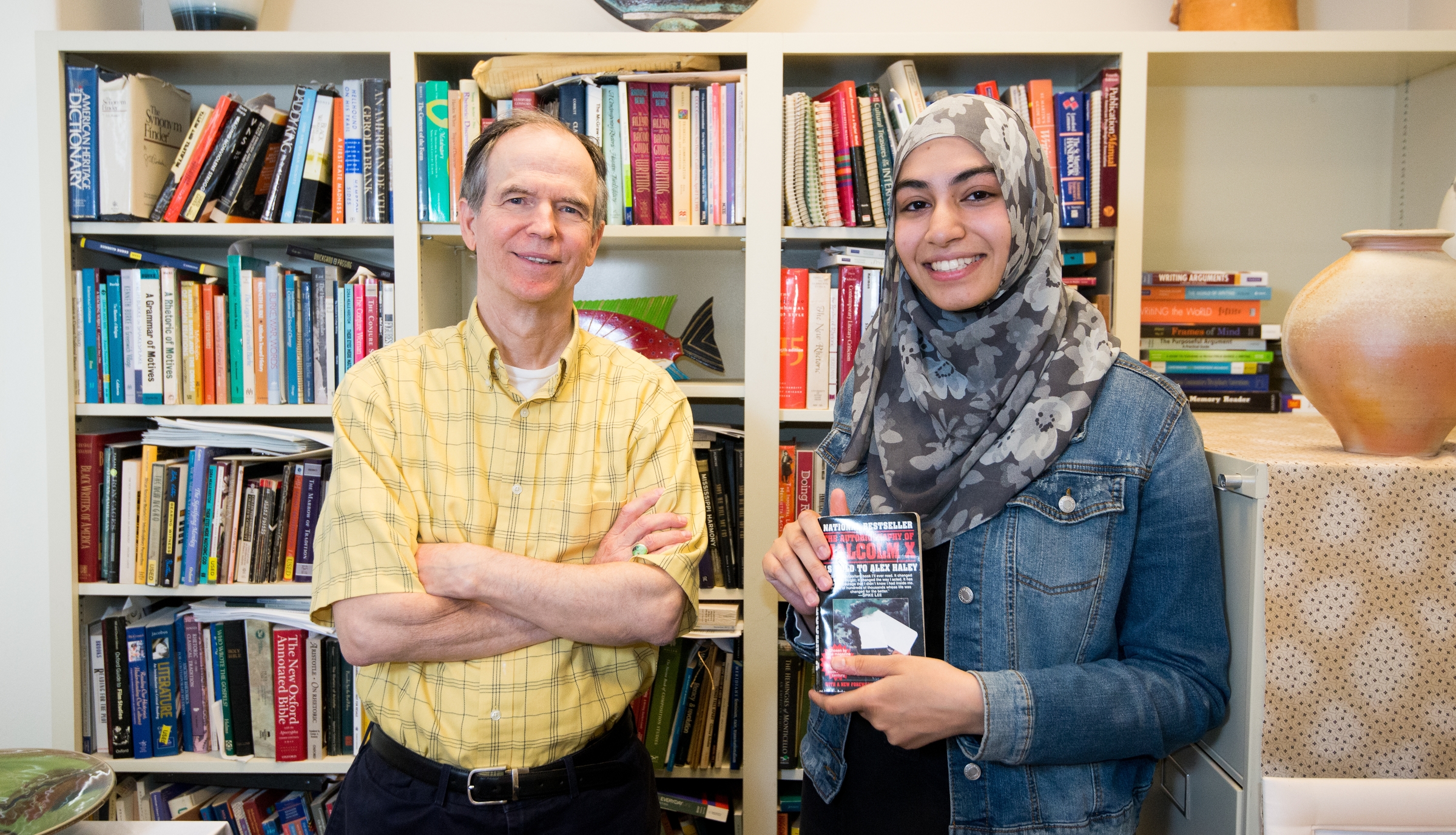Most pre-dental undergrads don’t conduct research on Malcolm X. But most pre-dental undergrads aren’t Sarah Syed.
Each year, about 10 Arizona State University students are chosen for the Center for the Study of Religion and Conflict’s undergraduate fellows program, where they work directly with a faculty member on research projects involving religion, conflict and peacemaking.
The students, who receive a stipend of $1,000 and take a special class with the center's director, are from different fields of study and bring a variety of perspectives to the research projects. Syed, a health science major in the College of Health Solutions, was intrigued by the topics in the 2015-16 program.
“I have had a deep interest in Malcolm X and his legacy for a very long time,” said Syed, who graduated this May. “And so, when I saw that there was a professor who was working on researching more about Malcolm X, I was like, ‘I definitely want to meet the professor.’”
Syed was paired with English professor Keith Miller, whose research focuses on the rhetoric and songs of the civil rights movement.
Miller — who has written two books about Martin Luther King Jr.’s speeches and sermons, as well as about Jackie Robinson and Frederick Douglass — is working on a book about “The Autobiography of Malcolm X,”The full title of the book is “The Autobiography of Malcolm X: As Told to Alex Haley,” and it was originally published in 1965. and the pair’s research focused on that. Syed called it one of the best opportunities of her time at ASU.
Miller and Syed sat down with ASU Now for a dialogue about their experience and what they discovered about this figure from America’s history.
Question: Professor Miller, how did your book on Malcolm X come about?
Miller: “The Autobiography of Malcolm X” … is a composite — it’s written by Malcolm X with his collaborator, and as it turns out, a lot of other people; his editors and libel lawyers.
So people write about Malcolm X based on what they think about “The Autobiography of Malcolm X,” but nobody’s written a book about “The Autobiography of Malcolm X,” even though it’s one of the most important books of the 20th century.
One of the most read, one of the most popular, and one of the most important — it’s had a huge impact on the national meaning of Malcolm X and all the scholarly interpretations of Malcolm X, and even on the whole national conversation about race. … My book is looking into who actually wrote what.
Q: So how did you two work together to untangle those things?
Miller: One of the things we worked on was — there are a lot of materials from Malcolm X that his widow kept [picks up a stack of photocopied papers on his desk]. … His widow kept [these materials] in her basement for like 30 years. Hundreds of pages of his speeches and letters and diaries. They only got donated … to the archives in Harlem and processed by 2004.
So I’ve only seen two books of people who make use of all this material. In this material are a whole lot of radio speeches that he made, which I had Xeroxed for me. So the radio speeches are important, and they’ve never been published. And they’re not even really mentioned in the scholarship, because a lot of the scholars were writing before 2004.
Syed: [So what professor Miller is doing is] comparing Malcolm X’s own words to what is written about Malcolm X in his so-called autobiography.
ASU English professor Keith Miller says there are a lot of misconceptions about "The Autobiography of Malcolm X." Top photo: Miller holds a stack of Malcolm X’s radio speeches. Photos by Ben Moffat/ASU Now
Q: Did you find any inconsistencies?
Miller: Yeah, there are inconsistencies between the autobiography and everything that everybody says about him, just about. And in the speeches, these speeches.
Q: So will the content of these speeches and other archives change the public perception of him?
Miller: Well, it broadens it. … His famous speeches are given in public and have been available, although they’re badly edited, since the 1960s or 1970s. They’ve been published.
But he spoke at least as often inside the mosque. But that hasn’t been published. … So the question is, to me, what does he say inside the mosque, and what does he say outside the mosque? And if you don’t really understand him inside the mosque, how in the heck do you understand him outside the mosque?
You need a comprehensive look at him instead of just looking at some famous speeches that the same people write about over and over and over.
So the radio sermons, even though they’re on the radio and they’re not inside the mosque, the primary audience, to me, sounds like it’s people who are already in the Nation of Islam. And it sounds like, based on the other evidence that we have, there’s similarity between what he says on the radio and what he would have said inside the mosque.
And what he says on the radio — he talks about a lot — a broader range of topics than he talks about in public. He talks about etiquette and table manners, and he talks about how men are supposed to treat women and how a wife is supposed to treat her husband, and how they’re supposed to do their parenting, and the kind of things that pastors say in churches or rabbis say in synagogues or imams say in mosques.
Which is a very different side of Malcolm X than what everybody knows about, which is this guy who’s really mad at the white people all the time.
Q: Do you think this will be surprising to some people?
Miller: I hope so.
Q: What was the process like for you both working on this project together? Did you go look through archives together? What did it look like?
Miller: Well, she read “The Autobiography of Malcolm X” and the big Pulitzer Prize autobiography that came out in 2011“Malcolm X: A Life of Reinvention” by Manning Marable, published in April 2011, won the 2012 Pulitzer Prize for History.. And then she read all of these [points to stack of papers on desk], so then we talked about all of that.
Syed: It looked a lot like this [laughter].
Q: So a lot of discussion?
Syed: Yeah. I really enjoyed the reading of the speeches. I almost didn’t want to give them back! [laughter] They were so much fun to see. Some of them are typewritten, but some of them are Malcolm X’s own notes that he has written and it’s just amazing to see his handwriting, you know, somebody who was so incredible and so inspiring.
To me, that was really valuable. And I just really enjoyed going through every speech. It was a lot of fun. That was one of the best opportunities I’ve had at school.
Sarah Syed said she gained a deeper knowledge of Malcolm X and his religious beliefs, as well as a broader understanding of the U.S. during the civil rights era.
Q: Professor Miller, what did you learn from working with Sarah on this project?
Miller: Well, Sarah helped me because I’ve never really known that many Muslims very well. So — other than Yasmin Saikia, who’s a professor. So [Sarah is] a Sunni Muslim and … kind of gave me more of a feeling for it than I had before. And she also gave me a tour of the mosque; she does tours of the mosque over there on Forest Avenue. So she gives tours to other people there, so she’s the —
Syed: I’m the president of the Muslim Students Association here at ASU, so I do tours all the time. … It’s the closest mosque to ASU and we can all walk there between classes.
Miller: And I’ve been at ASU a long time and I’d never been inside a mosque. So it was interesting to me to get to see it.
Q: How did you become interested in this subject area?
Miller: Well, King kind of got me into everything else. Everything African-American — African-American culture in general. …
I started working on King when I was doing my dissertation in the 1980s. And King was becoming a national holiday. So nobody trained in language had published about King’s speeches. So I just figured, why would I want to write the 500th book about Shakespeare instead of writing about King? Or why would I want to write the 100th book about William Faulkner? Believe it or not, to this day, in my opinion, there’s still a lack of really good research on King.
Q: Sarah, what was something you gained from this experience working with professor Miller?
Syed: Being a science student, I don’t spend a lot of time with humanities professors, so I just really enjoyed ... hearing his analysis of both the autobiography and his understanding of the speeches. … Malcolm X, in my opinion, sounds a lot more like a Christian minister than any imam I’ve ever heard. And because of that, I think he uses a lot of —
Miller: That was an interesting comment that she made to me. He quotes the Bible a lot and he doesn’t quote the Quran that much. It’s interesting.
Syed: Yeah. I think it’s also because of his familiarity. … One of the things I remember Dr. Miller was saying was that he was surprised that Malcolm X spent so much time in the mosque from reading Benjamin Karim’s biography. …
I think what Dr. Miller said was that he was surprised that Malcolm X was at the mosque almost every evening. And to me, I was surprised that he was surprised about that, because Muslims go to the mosque every day. Especially the men, they have to — they’re expected to visit the mosque every day. So like, my brother, he goes to the mosque at least four times every day.
Miller: Four times a day?
Syed: Yeah! Because the prayer is only about 10-15 minutes long, but in the evening, he’ll stay for a sermon every evening. So he goes to the mosque every day. And he’s a full-time pre-dental student, too, just like me. So it’s possible.
Miller: I can see going every day, but four times a day seems like an awful lot.
Syed: Well, it is a commitment, but I think it’s very normal in the Muslim community. It’s just something that … it’s just what you do.
Miller: None of that is in “The Autobiography of Malcolm X” at all. None of it.
ASU professor Keith Miller and pre-dental student Sarah Syed, with a copy of the book they spent months researching and discussing.
Syed: To see [Malcolm X’s] growth and his changing of his views was also very interesting to me. … I wanted to see, you know, what made him interested in Islam in the first place. Because that’s why I find Malcolm X interesting; I feel that I owe a debt of gratitude to him for establishing himself as an American Muslim in this country.
And so that’s why I feel an attachment to Malcolm X, and I definitely want to carry on his legacy of being a proud American Muslim who can stand up against injustice and still be so rooted in the country. …
I think one of the things that Dr. Miller said to me that made me feel sad was that — and now I see it after he pointed it out — that Malcolm X is almost being erased from our national memory. Or at least there’s an effort to kind of remove him or ignore him, or I don’t know, like, basically take him out of the picture. But we really put Dr. King on a pedestal.
Miller: The national memory is shrinking down so much to King. And when Barack Obama talks about the 1960s, he’s always talking about King and “I Have a Dream” and Selma, basically. He mentions Malcolm X in one of his autobiographies, but as president he hasn’t mentioned Malcolm X publicly at all.
Q: Do you think that’s because Malcolm X was viewed as more divisive than King?
Miller: I would never use that word for Malcolm X. Malcolm X was brilliant. Malcolm X understood Western colonialism and Western imperialism in Asia and Africa and so much of the world 30 years ahead of any professor at Harvard, Yale, Princeton or anywhere else. Thirty years.
And Malcolm X finished the eighth grade and he spent six years in prison reading. And he read all his history and he figured out that white people had mistreated all these people in ways that is now a standard view in the academy. And nobody thought that during his lifetime. Nobody.
Q: So is that a common misconception about him?
Miller: I disagree with the scholars on a lot of things, I disagree with the national memory. … “The Autobiography of Malcolm X” kind of turns him into a teddy bear at the end, which he wasn’t. Which is also apparent in his speeches.
They put him on a postage stamp in the 1990s. … The autobiography kind of creates this memory of him as an unthreatening person who’s no longer divisive. Because at the end, he’s a Universalist. But actually, at the end of his life, it was pretty complicated. He’s way more interesting than the national memory. He’s harder to pin down. And that’s kind of his point — is trying to be hard to pin down. He’s trying to challenge people.
Syed: I think Malcolm X is somebody who’s extremely rare in that he’s intellectually honest. … Whenever he finds that a previous view of his may conflict with his new conception of the truth from something that he’s learned, he will correct it, and I think that’s why he’s so hard to put into any kind of category.
Miller: Whereas almost everybody in public life, the president, the senators, the governors … you know, Donald Trump. Almost all of them, it’s very, very difficult for them to ever admit that they changed their mind.
Q: Why is it important to continue studying Malcolm X?
Syed: I think the reason why I am so concerned about the way Malcolm X is interpreted and whether we choose to include or exclude him from our national memory is because I think that decision is about whether we will choose to include or exclude Islam in America. Certainly Malcolm X had incredible impact, so to erase his presence from history means that we are choosing to deny the African-Americans and Islam a place in American story.
The Center for the Study of Religion and Conflict is a research unit of the College of Liberal Arts and Sciences. Learn more about the undergraduate research fellows program here.
More Law, journalism and politics
Can elections results be counted quickly yet reliably?
Election results that are released as quickly as the public demands but are reliable enough to earn wide acceptance may not always be possible.At least that's what a bipartisan panel of elections…
Spring break trip to Hawaiʻi provides insight into Indigenous law
A group of Arizona State University law students spent a week in Hawaiʻi for spring break. And while they did take in some of the sites, sounds and tastes of the tropical destination, the trip…

LA journalists and officials gather to connect and salute fire coverage
Recognition of Los Angeles-area media coverage of the region’s January wildfires was the primary message as hundreds gathered at ASU California Center Broadway for an annual convening of journalists…





